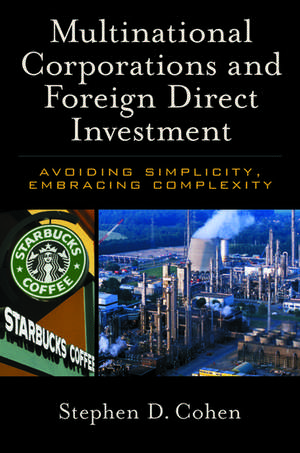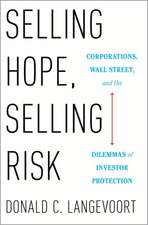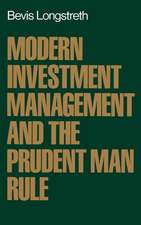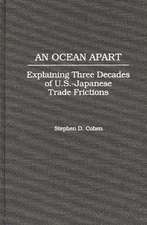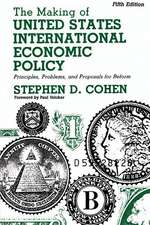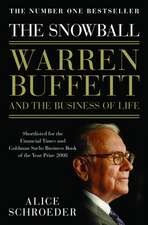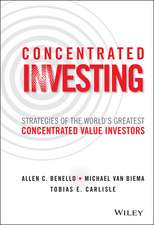Multinational Corporations and Foreign Direct Investment: Avoiding Simplicity, Embracing Complexity
Autor Stephen D. Cohenen Limba Engleză Paperback – 22 feb 2007
Preț: 371.97 lei
Preț vechi: 425.63 lei
-13% Nou
Puncte Express: 558
Preț estimativ în valută:
71.17€ • 74.31$ • 58.91£
71.17€ • 74.31$ • 58.91£
Carte tipărită la comandă
Livrare economică 24-31 martie
Preluare comenzi: 021 569.72.76
Specificații
ISBN-13: 9780195179361
ISBN-10: 0195179366
Pagini: 384
Ilustrații: line drawings
Dimensiuni: 159 x 232 x 17 mm
Greutate: 0.56 kg
Editura: Oxford University Press
Colecția OUP USA
Locul publicării:New York, United States
ISBN-10: 0195179366
Pagini: 384
Ilustrații: line drawings
Dimensiuni: 159 x 232 x 17 mm
Greutate: 0.56 kg
Editura: Oxford University Press
Colecția OUP USA
Locul publicării:New York, United States
Recenzii
Professor Cohen has written a masterly and exceptionally well balanced review of recent scholarly thinking on the role of multinational corporations in our contemporary global economy. I particularly liked his eschewing of any easy generalizations about their merits and demerits; and his recognition that these are likely to vary according to the motives for and types of MNC activity, and to the policies pursued by both national governments and supranational agencies. Altogether this is an eminently readable, yet intellectually satisfying volume. I warmly commend it both to students and teachers of international political economy and international business, and to all those interested in the economic and social challenges of globalization, and one of its chief architects viz. the MNC.
Stephen Cohen has produced a very comprehensive, balanced and fair view of the Multinational Corporation and FDI. He presents an intelligent, non-judgmental and honest summary of both sides of some very complex arguments and assumes that readers are intelligent enough to draw their own conclusions. He approaches questions about the MNC and FDI from the vantage points of both theory and practice and is always careful to ground his arguments directly in the appropriate political-economic context. This is a valuable addition to the literature on the multinational firm.
Stephen D. Cohen's Multinational Corporations and Foreign Direct Investment accomplishes exactly what it aims to do--avoid simplicity, and embrace complexity. Carefully nuanced chapters take both beginners and advanced practitioners through the spectrum of controversial issues about the most powerful international companies in the world.
Stressing the complexity, diversity and heterogeneity of FDI-related issues, this book carries a simple, but most appropriate message: Qualify and disaggregate, don't generalize! Those in the pro and con camps get another chance to check their priors. Those between the frontlines will find sufficient reason to remain where they are. And newcomers in the field will benefit from the balanced account of what we (don't) know about FDI to decide where in the vast middle ground to position themselves.
Stephen Cohen has produced a very comprehensive, balanced and fair view of the Multinational Corporation and FDI. He presents an intelligent, non-judgmental and honest summary of both sides of some very complex arguments and assumes that readers are intelligent enough to draw their own conclusions. He approaches questions about the MNC and FDI from the vantage points of both theory and practice and is always careful to ground his arguments directly in the appropriate political-economic context. This is a valuable addition to the literature on the multinational firm.
Stephen D. Cohen's Multinational Corporations and Foreign Direct Investment accomplishes exactly what it aims to do--avoid simplicity, and embrace complexity. Carefully nuanced chapters take both beginners and advanced practitioners through the spectrum of controversial issues about the most powerful international companies in the world.
Stressing the complexity, diversity and heterogeneity of FDI-related issues, this book carries a simple, but most appropriate message: Qualify and disaggregate, don't generalize! Those in the pro and con camps get another chance to check their priors. Those between the frontlines will find sufficient reason to remain where they are. And newcomers in the field will benefit from the balanced account of what we (don't) know about FDI to decide where in the vast middle ground to position themselves.
